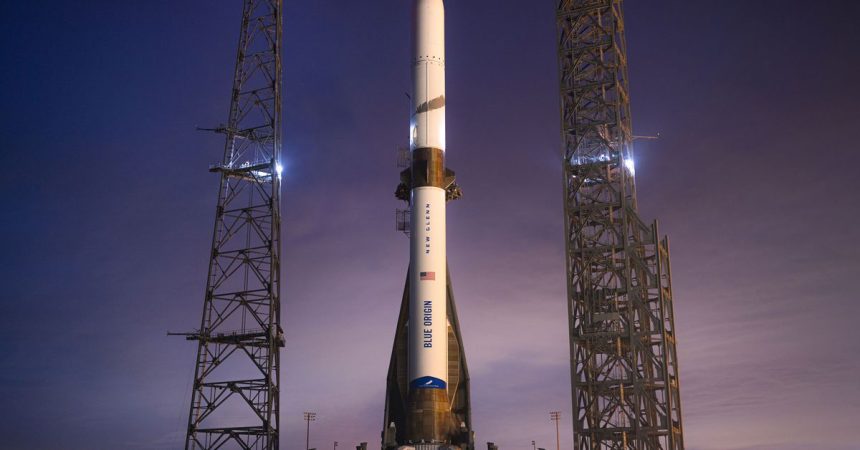The dawn of a new era in private space exploration unfolded today as Jeff Bezos’ Blue Origin achieved a significant milestone with the maiden orbital flight of its colossal New Glenn rocket. Launching from Cape Canaveral, Florida, the 320-foot-tall rocket embarked on its inaugural journey, marking a pivotal moment in Blue Origin’s pursuit of space dominance. While the mission ultimately encountered a setback with the loss of the first-stage booster during its landing attempt, the successful orbital insertion of the second stage and payload signifies a substantial leap forward for the company and intensifies the competition within the burgeoning commercial space sector.
The launch of New Glenn, after nearly a decade of meticulous development, signifies Blue Origin’s entry into the heavy-lift launch market, directly challenging SpaceX’s established position. The powerful BE-4 engines, designed and built in-house by Blue Origin, roared to life, propelling the NG-1 rocket skyward. The primary mission objective – achieving orbit – was successfully accomplished, marking a crucial victory for Blue Origin and demonstrating the rocket’s fundamental capabilities. This achievement puts New Glenn in direct competition with SpaceX’s Falcon Heavy, offering comparable payload capacity and aiming to secure a significant share of the lucrative satellite launch market.
The ambitious flight plan encompassed several audacious objectives, including the deployment of the Blue Ring Pathfinder, a prototype payload vehicle designed for future space missions. While the loss of the booster prevented the full realization of these secondary goals, the core mission’s success provides invaluable data and experience, paving the way for future iterations and refinements of the New Glenn system. Blue Origin’s CEO, Dave Limp, had emphasized the importance of learning from this initial launch, regardless of the outcome. The acquired data, both from the successful orbital insertion and the booster’s unfortunate demise, will undoubtedly contribute significantly to enhancing the reliability and performance of future New Glenn missions.
The loss of the first-stage booster, nicknamed “So You’re Telling Me There’s A Chance,” serves as a stark reminder of the inherent complexities and risks associated with spaceflight. While the booster successfully executed its initial descent towards the designated landing platform, communication was abruptly lost as it approached the recovery barge. Despite this setback, the booster’s controlled descent and attempted landing provided valuable insights into the reusability aspect of the New Glenn system, a crucial factor for cost-effectiveness in the long run.
The successful orbital insertion of the second stage and payload underscores the power and precision of New Glenn’s design and engineering. This achievement lays the groundwork for Blue Origin’s ambitious plans to deploy its own constellation of internet satellites, known as Project Kuiper, a direct competitor to SpaceX’s Starlink network. While the initial deployment of Project Kuiper satellites will rely on SpaceX’s Falcon 9 rockets, the eventual transition to New Glenn for heavier payloads will mark a critical step towards realizing Blue Origin’s vision of a robust and independent space infrastructure.
The successful launch of New Glenn, despite the booster setback, signifies a pivotal moment in the ongoing ‘billionaire space race’. It underscores Blue Origin’s growing capabilities and its determination to challenge SpaceX’s dominance in the commercial space sector. This event marks not only a technological triumph but also a symbolic shift in the landscape of space exploration, as private companies increasingly take center stage in humanity’s push beyond Earth’s boundaries. The competition between Blue Origin and SpaceX is poised to accelerate innovation and drive down the cost of access to space, ultimately benefiting scientific research, commercial ventures, and the broader human pursuit of understanding the cosmos.



